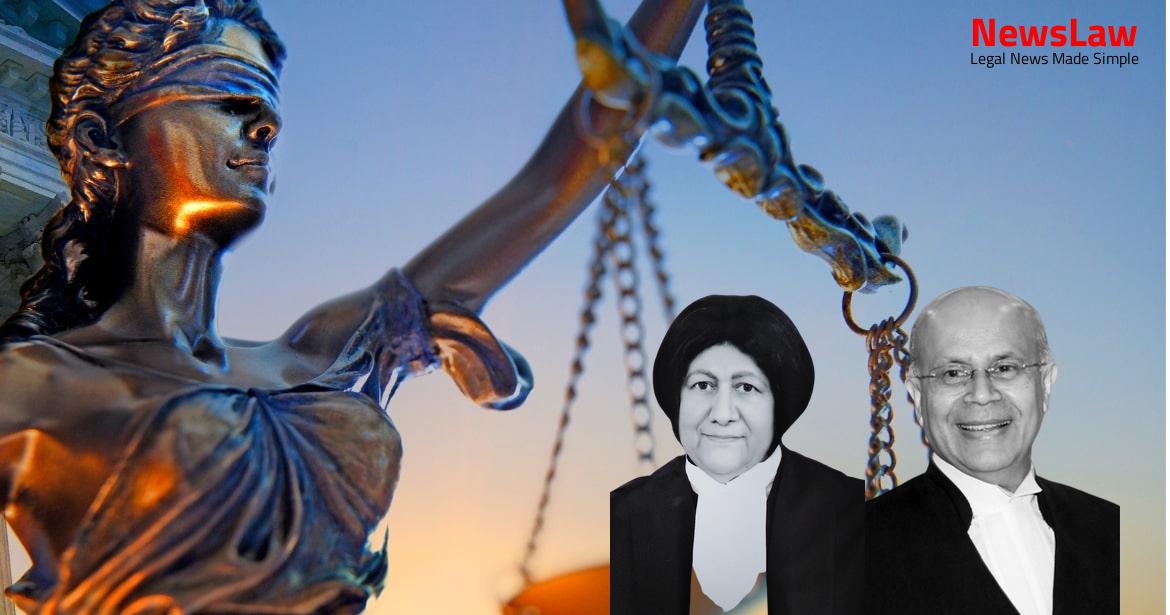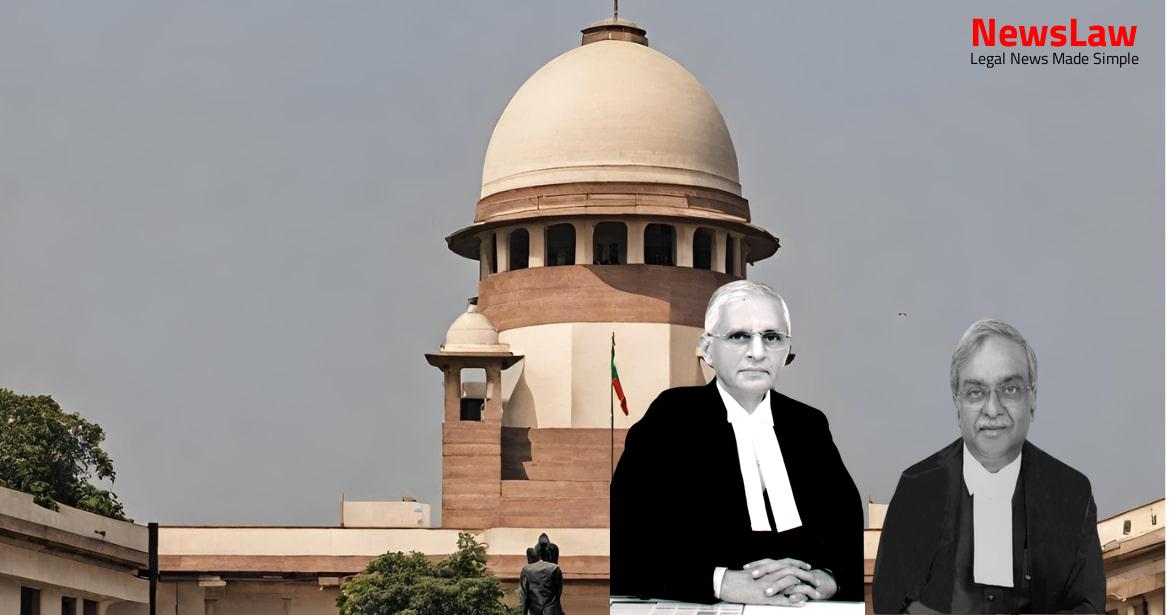The recent court judgment emphasizes the importance of strict interpretation and adherence to the provisions of the Maharashtra Control of Organised Crime Act (MCOCA). The court’s legal analysis delves into the need for precise application of the MCOCA provisions to effectively combat organized crime syndicates and protect the rights of the accused. This summary focuses on the court’s insightful examination of the law’s stringent provisions and the necessity for authorities to strictly adhere to them for proper implementation of the act.
Facts
- The Additional Commissioner of Police approved the addition of Sections 3(1)(ii), 3(2), and 3(4) of MCOCA in the case against six accused, including the appellant.
- Preventive action taken against the Team Leader and accused No. 5 Abhishek was unsuccessful.
- Offences under the Arms Act were registered against the Team Leader and accused No. 5 and 6.
- The appellant applied for pre-arrest bail and was granted ad interim bail by the Sessions Judge, Nagpur.
- The accused persons threatened the complainant to hand over property and money, creating terror and forcefully taking money.
- The accused frequently commit crimes with new offenders, indicating the presence of a crime syndicate.
- Multiple charge sheets were filed jointly against the crime syndicate, indicating a pattern of criminal activities.
- The Team leader and accused No. 5 committed heinous offences for pecuniary benefit despite preventive actions being taken.
- The accused No. 5 had obtained Anticipatory Bail before application of MCOCA.
- A proclamation was issued declaring the appellant as an ‘absconder’.
- Appellant challenged the sanction order dated 05.11.2020 on the grounds that the existence of ‘organised crime syndicate’ was not specifically recorded by the sanctioning authority as required by MCOCA.
- The appellant argued that mere satisfaction on ‘continuing unlawful activity’ and ‘organised crime’ was not enough for sanction.
- High Court considered the appellant’s background and involvement in other cases with Roshan Sheikh and others.
- The High Court found no legal flaw in the sanction order and dismissed the writ petition, emphasizing that its observations would not affect the trial or the appellant’s defense.
Also Read: Ensuring Maintenance Rights: Court’s Legal Analysis
Issue
- The submissions made by the appellant are based on incorrectly framed questions and contentions.
- The appellant’s contentions start with a wrong premise as seen from the opening paragraph of the written submissions.
- The main issue pointed out by the appellant is whether prior approval under Section 24(1)(a) is valid.
- The correct question that should be considered is whether the prior approval given by the competent authority is valid.
Also Read: Analyzing Evidentiary Value in Criminal Conviction Case
Arguments
- The learned senior counsel for the appellant argued that the provisions of the Maharashtra Control of Organised Crime Act, 1999 (MCOCA) must be strictly construed and authorities must adhere to them.
- The threshold requirement for the involvement of the appellant in two or more cases for pecuniary benefit under MCOCA is not met in the present case.
- The sanction order is based on irrelevant material and deserves to be set aside.
- The allegation of the appellant being an absconder is challenged, stating that he was available in Nagpur and cooperated with the judicial process.
- The senior counsel highlighted that the sanction order did not meet the threshold requirement of two charge-sheeted cases with applicable MCOCA allegations.
- The prosecution cannot rely on confessions in one case without meeting the threshold requirement under MCOCA.
- The High Court dismissed the petition, upholding the sanction order based on specific satisfaction recorded in it.
- The Senior advocate emphasized that reliance on recorded confessions for the sanction order was improper and self-serving.
- The State’s counsel contended that a minimum of two charge-sheets with specific allegations is required to invoke MCOCA provisions.
- The State argued that the plea of ‘other advantage’ was an afterthought and impermissible for improvement over the sanction order reasons.
- Specific cases mentioned were Crime Nos. 13 of 2012 and 482 of 2015, where acquittal and quashing of proceedings occurred, making them inadmissible for MCOCA invocation.
- The allegations of pecuniary benefit only occur in the present case of Crime No 251 of 2020 according to the arguments presented.
- The learned counsel for the State argued that when credible information about an offense is present, it can be relied upon for sanction.
- The validity of the sanction can be determined during the trial court proceedings where the sanctioning authority can be examined and cross-examined by the accused.
- Confessional statements can be considered in the sanction order, especially when they involve the confessor and co-accused.
- The appellant’s choice not to submit to the law impacts the submissions concerning personal liberty and the application of MCOCA.
- The conditions for invoking MCOCA, such as filing of charge-sheets, have been met in the mentioned cases.
- The invocation of MCOCA aims to prevent offenders from escaping justice due to witness tampering or non-cooperation.
- The arguments about the appellant’s non-involvement in crimes eligible for MCOCA invocation are disputed by the State’s counsel.
- Confessional statements can be considered valid when granting sanction under MCOCA, as per legal precedents.
- The confessional statements directly implicate the appellant as an active member of an organized crime syndicate.
- The appellant’s status as an absconder under legal provisions impacts the relief sought under Article 136 of the Constitution.
- The use of confessional statements in according sanction is not prohibited by MCOCA and can aid in forming a prime facie view of the matter.
Also Read: Legal Authority and Res Judicata in Representation Matter
Analysis
- The provisions of MCOCA seek to curb the activities of organized crime syndicates or gangs.
- The legislative intent of MCOCA is not limited to curbing only the activities mentioned in the Statement of Objects and Reasons but also aims to control various other activities of organized crime syndicates to minimize fear spread in society.
- Strict construction of the stringent provisions of MCOCA is essential, and authorities must strictly interpret and adhere to these provisions.
- The need for ‘strict construction’ and ‘strict adherence’ by the authorities in the context of MCOCA is crucial for the proper implementation of the act.
- MCOCA aims to deal with criminal activities by organized crime syndicates and protect witnesses as one of the objectives of the enactment.
- The judgement emphasizes the importance of proper application of the provisions of MCOCA in dealing with organized crime and ensuring the rights of the accused are upheld.
- The enactment of MCOCA was a response to the inadequacy of existing laws in curbing organized crime and the need for special provisions to tackle the menace effectively.
- Section 2(d) of the Act defines ‘continuing unlawful activity’ as an activity prohibited by law punishable with imprisonment of three years or more, undertaken as a member of an organised crime syndicate in respect of which more than one charge-sheets have been filed within ten years.
- Organised crime, as per Section 2(e), involves unlawful activity by an individual using violence, coercion, or other means for pecuniary benefits or promoting insurgency.
- Section 3 of MCOCA specifies punishments for organised crime, including death or imprisonment for life in case of resulting death, and imprisonment for not less than five years in other cases.
- The Act aims to control organised crime with stringent provisions and the power to intercept communications in certain circumstances.
- Under Section 23, approval for investigation and prosecution in organised crime cases must be obtained from specified police officials.
- The Statement of Objects and Reasons highlights the need for this enactment to address the serious threat of organised crime in society.
- Observations made by the High Court were only prima facie and would not influence the trial or prejudice the appellant’s legitimate defense.
- The term ‘other advantage’ in the statute cannot be read as ejusdem generis with ‘pecuniary benefits’ and ‘undue economic advantage’.
- Penal statutes should not be enlarged by implication and doubts regarding their application should be resolved in favor of the accused.
- The organized crime mentioned involves activities such as contract killing, extortion, smuggling contrabands, illegal narcotics trade, kidnapping for ransom, collection of protection money, and money laundering.
- Investigations into organized crime can only commence after obtaining approval from the authorities concerned.
- The MCOCA, being a special penal statute, should not be applied impracticably or in a way that renders the law nugatory.
- The purpose of the law is to combat crimes of a special nature and prevent offenders from evading legal consequences.
- The expression ‘other advantage’ in the MCOCA statute should be strictly construed and interpreted based on the specific language of the enactment.
- The Full Bench of the Bombay High Court examined the connotations of ‘other advantage’ in a specific case, providing clarity on its interpretation.
- Strict construction of laws ensures that they are applied within the letter and spirit of the statute, without expanding them through implications or equitable considerations.
- Challenge to the judgment and sanctioning order was required to be rejected as the appellant had been declared absconder.
- Contentions urged on behalf of the appellant were baseless.
- Claims towards fundamental rights cannot be made without adhering to the process of law.
- Notices were issued to the respondents, serving the cause of justice to deal with the matter on merits.
- Examination of the matter on merits was conducted before considering the effect of absconsion.
- Submissions for consideration of the appellant’s case due to stringent provisions do not negate the impact of the appellant’s blameworthy conduct.
Decision
- Appeal fails and is dismissed
- The decision is upheld based on the reasons provided above
Case Title: ABHISHEK Vs. THE STATE OF MAHARASHTRA (2022 INSC 618)
Case Number: Crl.A. No.-000869-000869 / 2022



